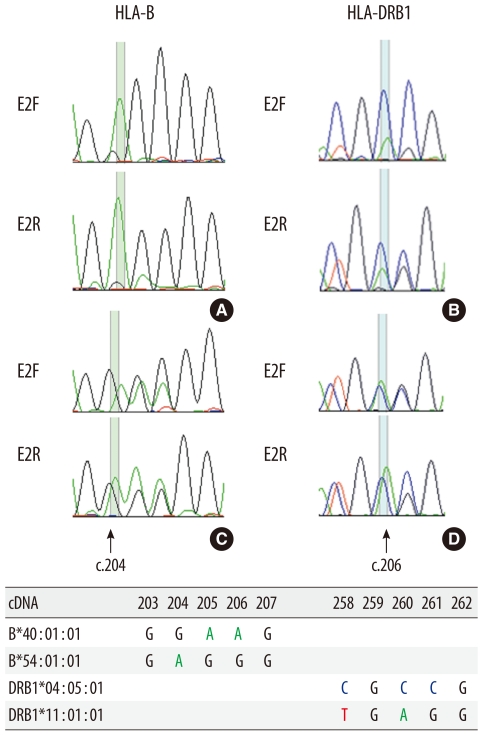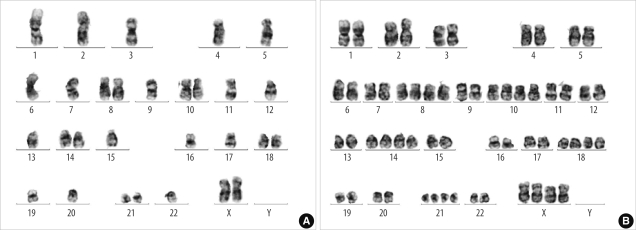Korean J Lab Med.
2011 Oct;31(4):302-306. 10.3343/kjlm.2011.31.4.302.
False Homozygosity Results in HLA Genotyping due to Loss of Chromosome 6 in a Patient with Acute Lymphoblastic Leukemia
- Affiliations
-
- 1Department of Laboratory Medicine, Seoul National University College of Medicine, Seoul Korea. eysong1@snu.ac.kr
- KMID: 1781698
- DOI: http://doi.org/10.3343/kjlm.2011.31.4.302
Abstract
- Loss of heterozygosity (LOH) in chromosome 6p has been reported in a number of tumors and some hematologic malignancies, including ALL. LOH in chromosome 6p, on which the HLA genes are located, can give rise to false homozygosity results in HLA genotyping of patients with hematologic malignancies. Here we report false homozygosity results in HLA genotyping due to the loss of whole chromosome 6 in the neoplastic cells of a patient with ALL. A 33-yr-old Korean female patient was admitted for the evaluation of leukocytosis detected during a workup for headache. Her initial white blood cell count was 336.9x109/L with 84% of blasts in the differential count. Precursor-B lymphoblastic leukemia was diagnosed from a subsequent bone marrow study. HLA high-resolution genotyping of the patient was requested at the time of diagnosis for possible hematopoietic stem cell transplantation. Homozygosity results (A*02:01, B*54:01, C*08:01, DQB1*04:01) were obtained, except for the DRB1 locus (DRB1*04:05, DRB1*11:01), in sequence-based typing. Conventional karyotyping of bone marrow metaphase cells revealed chromosomal abnormalities, with loss of multiple chromosomes including chromosome 6, and reduplication of the remaining chromosomes: 29,X,+X,+8,inv(9)(p11q13),+10,+14,+18,+21[15]/58,idemX2[3]/46,XX,inv(9)[2]. LOH at the HLA region was suspected and HLA genotyping was repeated with the peripheral blood in remission state after induction chemotherapy. All 5 HLA loci were typed as heterozygous (A*02:01, A*02:06, B*40:01, B*54:01, C*03:04, C*08:01, DRB1*04:05, DRB1*11:01, DQB1*03:01, DQB1*04:01). To avoid false HLA typing results in patients with hematologic malignancies, clinicians, as well as laboratory personnel, need to be aware of such problems and take appropriate precautions.
MeSH Terms
-
Adult
Chromosome Duplication
*Chromosomes, Human, Pair 6
Diagnostic Errors
Female
Genotype
HLA Antigens/*genetics
Hematopoietic Stem Cell Transplantation
Humans
Karyotyping
Leukocyte Count
*Loss of Heterozygosity
Nerve Tissue Proteins/genetics
Precursor Cell Lymphoblastic Leukemia-Lymphoma/diagnosis/*genetics/therapy
RNA-Binding Proteins/genetics
Figure
Reference
-
1. Garrido F, Cabrera T, Concha A, Glew S, Ruiz-Cabello F, Stern PL. Natural history of HLA expression during tumour development. Immunol Today. 1993; 14:491–499. PMID: 8274189.
Article2. Ferrone S, Marincola FM. Loss of HLA class I antigens by melanoma cells" molecular mechanisms, functional significance and clinical relevance. Immunol Today. 1995; 16:487–494. PMID: 7576053.3. Garrido F, Ruiz-Cabello F, Cabrera T, Pérez-Villar JJ, López-Botet M, Duggan-Keen M, et al. Implications for immunosurveillance of altered HLA class I phenotypes in human tumours. Immunol Today. 1997; 18:89–95. PMID: 9057360.
Article4. Browning M, Petronzelli F, Bicknell D, Krausa P, Rowan A, Tonks S, et al. Mechanisms of loss of HLA class I expression on colorectal tumor cells. Tissue Antigens. 1996; 47:364–371. PMID: 8795136.
Article5. D'Urso CM, Wang ZG, Cao Y, Tatake R, Zeff RA, Ferrone S. Lack of HLA class I antigen expression by cultured melanoma cells FO-1 due to a defect in B2m gene expression. J Clin Invest. 1991; 87:284–292. PMID: 1898655.6. Spies T, DeMars R. Restored expression of major histocompatibility class I molecules by gene transfer of a putative peptide transporter. Nature. 1991; 351:323–324. PMID: 2034277.
Article7. Browning MJ, Krausa P, Rowan A, Hill AB, Bicknell DC, Bodmer JG, et al. Loss of human leukocyte antigen expression on colorectal tumor cell lines: implications for anti-tumor immunity and immunotherapy. J Immunother Emphasis Tumor Immunol. 1993; 14:163–168. PMID: 8297898.8. Koopman LA, Mulder A, Corver WE, Anholts JD, Giphart MJ, Claas FH, et al. HLA class I phenotype and genotype alterations in cervical carcinomas and derivative cell lines. Tissue Antigens. 1998; 51:623–636. PMID: 9694355.
Article9. Torres MJ, Ruiz-Cabello F, Skoudy A, Berrozpe G, Jimenez P, Serrano A, et al. Loss of an HLA haplotype in pancreas cancer tissue and its corresponding tumor derived cell line. Tissue Antigens. 1996; 47:372–381. PMID: 8795137.
Article10. Soong TW, Hui KM. Locus-specific transcriptional control of HLA genes. J Immunol. 1992; 149:2008–2020. PMID: 1517566.11. Koopman LA, van Der Slik AR, Giphart MJ, Fleuren GJ. Human leukocyte antigen class I gene mutations in cervical cancer. J Natl Cancer Inst. 1999; 91:1669–1677. PMID: 10511595.
Article12. Jiménez P, Cantón J, Collado A, Cabrera T, Serrano A, Real LM, et al. Chromosome loss is the most frequent mechanism contributing to HLA haplotype loss in human tumors. Int J Cancer. 1999; 83:91–97. PMID: 10449614.13. McEvoy CR, Morley AA, Firgaira FA. Evidence for whole chromosome 6 loss and duplication of the remaining chromosome in acute lymphoblastic leukemia. Genes Chromosomes Cancer. 2003; 37:321–325. PMID: 12759931.
Article14. Coppage M, Busacco A, Lenog N, Rothberg P, Phillips G, Becker M. Leukemia specific loss of heterozygosity at MHC locus detected at confirmatory typing of HSCT recipient with CLL. Hum Immunol. 2010; 71(S):S130.15. Maleno I, López-Nevot MA, Cabrera T, Salinero J, Garrido F. Multiple mechanisms generate HLA class I altered phenotypes in laryngeal carcinomas: high frequency of HLA haplotype loss associated with loss of heterozygosity in chromosome region 6p21. Cancer Immunol Immunother. 2002; 51:389–396. PMID: 12192539.
Article16. Masuda K, Hiraki A, Fujii N, Watanabe T, Tanaka M, Matsue K, et al. Loss or down-regulation of HLA class I expression at the allelic level in freshly isolated leukemic blasts. Cancer Sci. 2007; 98:102–108. PMID: 17083564.
Article17. Baccichet A, Qualman SK, Sinnett D. Allelic loss in childhood acute lymphoblastic leukemia. Leuk Res. 1997; 21:817–823. PMID: 9393596.
Article18. Takeuchi S, Bartram CR, Wada M, Reiter A, Hatta Y, Seriu T, et al. Allelotype analysis of childhood acute lymphoblastic leukemia. Cancer Res. 1995; 55:5377–5382. PMID: 7585604.19. Ljungman P, de Witte T, Verdonck L, Gahrton G, Freycon F, Gravett P, et al. Bone marrow transplantation for acute myeloblastic leukaemia: an EBMT Leukaemia Working Party prospective analysis from HLA-typing. Br J Haematol. 1993; 84:61–66. PMID: 8338779.
Article20. . Standards for histocompatibility testing, version 5.6.1. Updated on Oct 2009. http://www.efiweb.eu/index.php?id=102.21. Treleaven JG, Barrett AJ, editors. Hematopoietic stem cell transplantation in clinical practice. 2008. 1st ed. Churchill Livingstone;p. 224.
- Full Text Links
- Actions
-
Cited
- CITED
-
- Close
- Share
- Similar articles
-
- A Case of Acute Lymphoblastic Leukemia with ider(9)(q10)t(9;22)(q34;q11.2)
- Two Cases of Chronic Myeloid Leukemia in Lymphoid Blast Phase Presented as Philadelphia-Positive Acute Lymphoblastic Leukemia
- The e1a3 BCR-ABL1 Fusion Transcript in Philadelphia Chromosome-Positive Acute Lymphoblastic Leukemia
- Precursor B-Cell Acute Lymphoblastic Leukemia in Two Patients with a History of Cytotoxic Therapy
- A Case of Acute Lymphoblastic Leukemia with Facial Nerve Palsy in Infant



